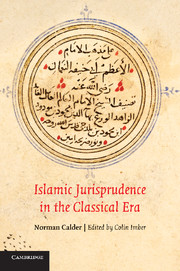Book contents
- Frontmatter
- Contents
- Editor's Preface
- Introduction
- 1 The Ḥanafī Law on Fornication
- 2 Nawawī and the Typologies of Fiqh Writing
- 3 Scholars, Muftis, Judges and Secular Power: The Need for Distinctions
- 4 The Social Function of Fatwas
- Afterword: Scholarly Priorities and Islamic Studies: The Reviews of Norman Calder (Robert Gleave)
- Principal Sources Used
- Index
Afterword: Scholarly Priorities and Islamic Studies: The Reviews of Norman Calder (Robert Gleave)
Published online by Cambridge University Press: 04 May 2010
- Frontmatter
- Contents
- Editor's Preface
- Introduction
- 1 The Ḥanafī Law on Fornication
- 2 Nawawī and the Typologies of Fiqh Writing
- 3 Scholars, Muftis, Judges and Secular Power: The Need for Distinctions
- 4 The Social Function of Fatwas
- Afterword: Scholarly Priorities and Islamic Studies: The Reviews of Norman Calder (Robert Gleave)
- Principal Sources Used
- Index
Summary
Why does the law matter anyway? For a student it is easy to enjoy fiqh … more difficult to account for this pleasure, and extremely difficult to re-express the theological message that is there encoded.
The pleasure Norman Calder derived from reading fiqh texts is clear from the chapters in this book; his skill in re-expressing their theological message is evident here also. And although I am not convinced that all students would agree that fiqh is ‘easy to enjoy’, anyone who studied with him will detect in this volume of studies a characteristic precision of expression and depth of insight. Norman's book reviews are packed with revealing comments (such as that cited above), and though academics do not always consider their book reviews their greatest achievements, in Norman's case, they repay closer inspection, both individually and collectively.
Like works of fiqh and uṣūl, academic book reviews have a ‘stability of form and content’. There is the obligatory summary of the reviewed work's contents, followed by an account of its position relative to other scholarship on the subject, and, finally, the reviewer's critical evaluation of the work's contribution to the field. Within the last of these, reviewers will engage both with the content of the work (the account it offers and the thesis proposed by the author), and the stylistic and technical merits of the book (the quality of prose, the utility and accuracy of the critical apparatus and transliteration, etc.).
- Type
- Chapter
- Information
- Islamic Jurisprudence in the Classical Era , pp. 201 - 222Publisher: Cambridge University PressPrint publication year: 2010



